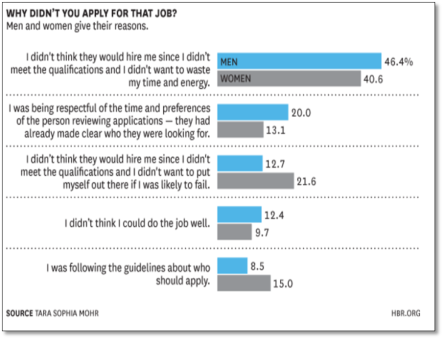Sheryl Sandberg’s book Lean In discusses leadership and confidence issues for women. In it, she cites this statistic: men are likely to apply for a job when they meet only 60 percent of the qualifications, but women usually apply only if they meet 100 percent of them.
The finding comes from a Hewlett Packard internal personnel report and has been quoted in several publications about women in the workplace. It’s widely regarded as a sign that women need more confidence – that we are too timid to compete for jobs that we might very well be hired for if we tried harder.
But, as usual, the top line number isn’t as meaningful as the numbers beneath. Tara Sophia Mohr, writing for the Harvard Business Review, surveyed 1,000 (American) men and women about why they didn’t apply for the job when they met at least 60 percent of the qualifications. Only about 10% of women and 12% of men indicated that “I didn’t think I could do the job well” was their top reason for not applying. The real reasons were remarkably similar between men and women.
Hating to waste time on a job that was probably out of reach was the most important reason people passed on opportunities, followed by respect for the process (following guidelines about who should apply, and respecting the wishes of the person posting.)

Here’s the factor that struck me as a significant difference between men and women who responded: “I didn’t think they would hire me and I didn’t want to put myself out there if I was likely to fail.” Women cited fear of failure at a rate of 70 percent more often than men.
Is it true that women give up more easily than men? Do we fear failure more? If so, what could be the cause? In studies conducted in the 1980s, psychologist Carol Dweck looked at how fifth graders of equal abilities handled challenging new materials. She found that girls quickly give up when given something that feels hard to them. In fact, she found that straight-A girls gave up the most easily of all the study subjects. Boys, on the other hand, see something new as a challenge and are more likely to keep trying until they get it right.
One theory is that girls, who mature earlier than boys and tend to be better at tasks that require focus, are often praised for being “good” and “smart.” These qualities, however admirable, feel like qualities you’re born with, much like the compliments you get for being pretty. Girls get the impression that you’re born smart, or average, or not very smart, and there’s not much you can do about it.
Boys, on the other hand, are more often praised for when they work hard and master new skills. They are being given the message that hard work and practice will improve their performance. I experienced this first hand growing up in my traditional Midwestern family. My father was more patient with my brother when he was learning a practical, hands-on skill; he’d make him do it over and over again until he got it right, providing feedback at each step. When I attempted to use a new tool or put something together for the first time, he’d be more likely to just take the tool out of my hand and do it himself. To his day, I almost always give up on anything mechanical after just one try; I have bought into the idea that I’m not mechanical.
I also think more girls than boys are perfectionists. The Hewlett-Packard study revealed what many women know inside: that women only feel really confident when they’re perfect. If that sounds like a soul-crushing proposition, you’re right. Ask the best dressed, impeccably groomed and gorgeous woman how she feels going up to accept her award, and if she’s being truthful, she’ll say “I worry that this dress makes me look fat.”
Journalists Katty Kay and Claire Shipman, writing for the Atlantic on “The Confidence Gap,” write: “We watch our male colleagues take risks, while we hold back until we’re sure we are perfectly ready and perfectly qualified. We fixate on our performance at home, at school, at work, at yoga class, even on vacation.”
Women may not realize that not everyone worries in the same way or plays by the same rules. Men will risk failure more often in order to get a bigger reward. They value reward more than they fear failure. I remember quitting after the first time I tried a complex maneuver on the monkey bars and fell off. I skinned my knee, and it hurt. If I’d known then what I know now, I’d have climbed right back on the monkey bars again.

